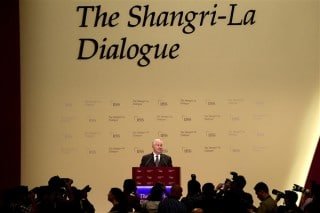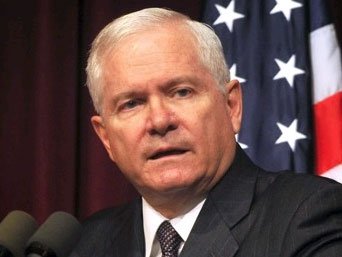by Jim Garamone 
American Forces Press Service
SINGAPORE, June 4, 2011 – Defense Secretary Robert M. Gates explained U.S. policy toward China, the future in Afghanistan and the threat posed by cyber attacks and anti-access capabilities during a question-and-answer session at the Shangri-La Dialogue security summit here today.
The annual conference is sponsored by the International Institute of Strategic Studies, and it brings together defense leaders from around the region.The questions from the delegates were direct and pointed, but respectful, and Gates put his answers in context.
The Chinese often object to U.S. military planes and ships sailing near their coast. A delegate wanted to know why the United States didn’t just stop such provocations. Gates explained that everything the U.S. military does is covered by international law, and the United States respects all international boundaries.
“But it all comes down to one word: transparency,” the secretary said. “The more transparent nations are in regards to what they are doing, what their intentions are, what their programs are, the less need there is for us unilaterally to figure that out on our own.
“One of my colleagues long ago in the intelligence business said there are two types on information we seek secrets and mysteries,” the secretary continued. “Mostly what we are trying to break are the mysteries. Greater transparency of intent, and greater transparency of capabilities which we are fully prepared to reciprocate will help us in this arena.”
China is just one of the nations that is developing anti-access capabilities designed to keep forces from approaching an area. The terror group Hezbollah a nonstate entity has anti-ship cruise missiles with a range of 65 miles that potentially put U.S. ships operating off the coast of Lebanon at risk. Still, anti-access capabilities are not an imminent concern, the secretary said.
“We have a number of programs under way that are intended to deal with this issue,” Gates said. “We have been paying attention to this problem for a number of years. We take this seriously, we understand the long-term challenge, and we are spending significant sums of money in these efforts in a number of different areas.” The secretary added that he believes that military investments in these technologies will be protected from the budget knife.
The cyber world is a growing domain, and threats abound, Gates said.
“One of the things I have been doing over the past four and a half years is to examine this world of cyber in the context of defense responsibilities, and what in fact does constitute an offensive act by a government, what would constitute an act of war in the cyber world that would require some kind of response, in kind or kinetically,” Gates said.
The Defense Department is beginning the process, Gates said, and he called for a more open dialogue among countries that would establish “rules of the road with respect to cyber so we have some understanding of the left and right lanes.”
The secretary said he does not want some country to inadvertently or intentionally begin something that escalates out of control.
“We could avoid some serious international tensions in the future if we could establish some rules of the road as early as possible to let people know what kind of acts are acceptable, what kind of acts are not, and what kind of acts may, in fact, be acts of war,” he said.
 The secretary also spoke about the need for Taliban reconciliation in Afghanistan.
The secretary also spoke about the need for Taliban reconciliation in Afghanistan.
“I think there is a generally accepted view that nearly all conflicts of this kind eventually come to a close through some kind of political settlement,” he said. “The reality is, in my view, the prospects for a political settlement will not become real until the Taliban the others begin to conclude they cannot win militarily.”
Coalition and Afghan forces have expelled the Taliban from their stronghold in Helmand and Kandahar provinces, Gates noted. “If we sustain those successes, we can expand the security bubble,” he said. The Taliban already are under pressure in Afghanistan, and coalition and Afghan forces are degrading their capabilities. If the pressure can continue through the year, he added, “then perhaps this winter there is the possibility of some type of political talks” on reconciliation.
The secretary made it clear that the Taliban must sever relationship with al-Qaida, must agree to live under the Afghan constitution and must put down their arms.
“That said, the Taliban are probably part of the political fabric of Afghanistan at this point,” Gates said. “If they abide by … all the conditions, … they potentially have a political role in the future.”
The secretary said the political opportunities will flow from the military pressure.
“The growth of the Afghan national security forces, the transition to Afghan security lead and the various development programs that many nations have under way in Afghanistan all are important contributors to the future of the country,” he said.
Biographies:
Related Sites:
- Travels With Gates
- Shangri-La Dialogue
ATTENTION READERS
We See The World From All Sides and Want YOU To Be Fully InformedIn fact, intentional disinformation is a disgraceful scourge in media today. So to assuage any possible errant incorrect information posted herein, we strongly encourage you to seek corroboration from other non-VT sources before forming an educated opinion.
About VT - Policies & Disclosures - Comment Policy



